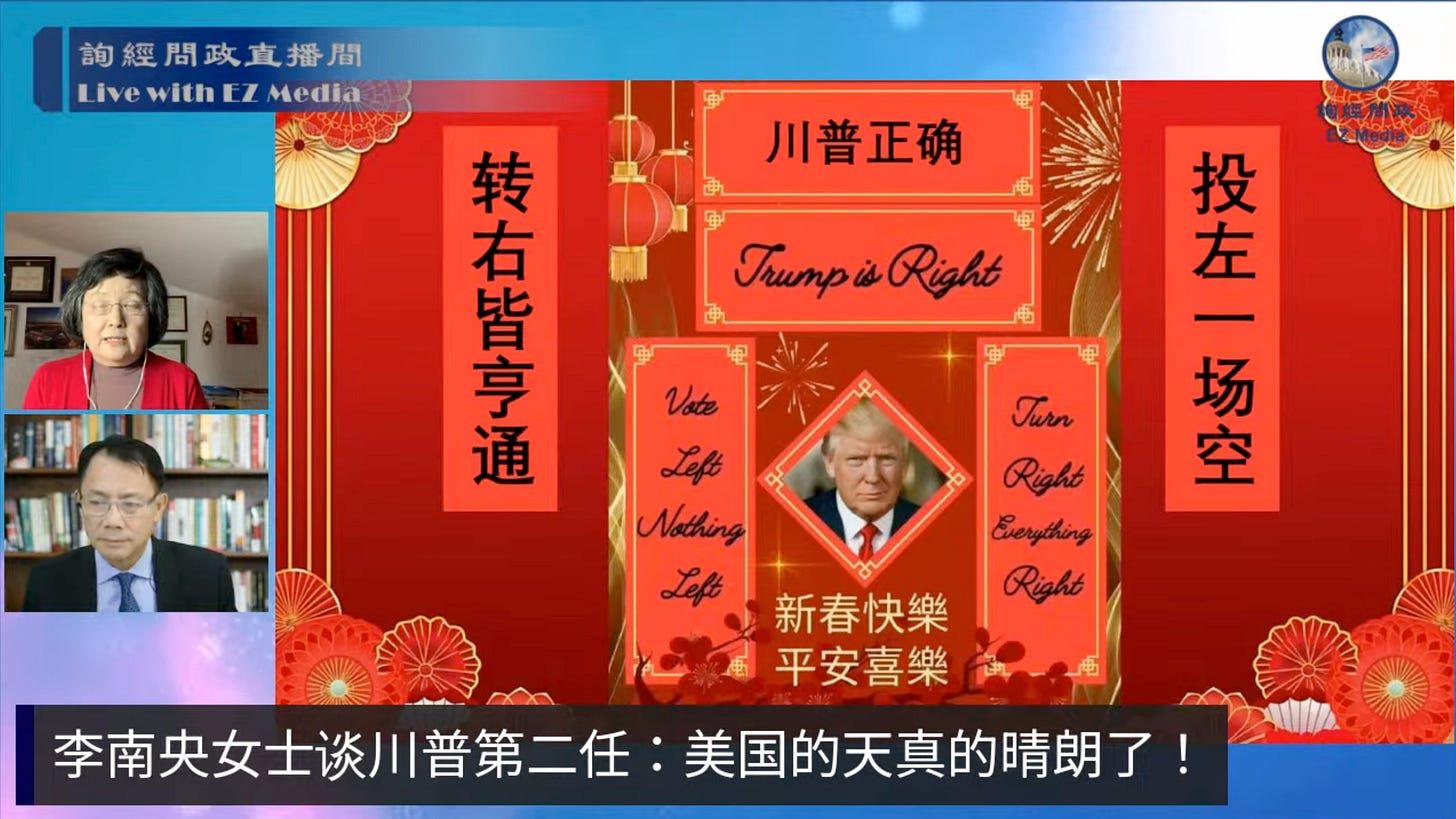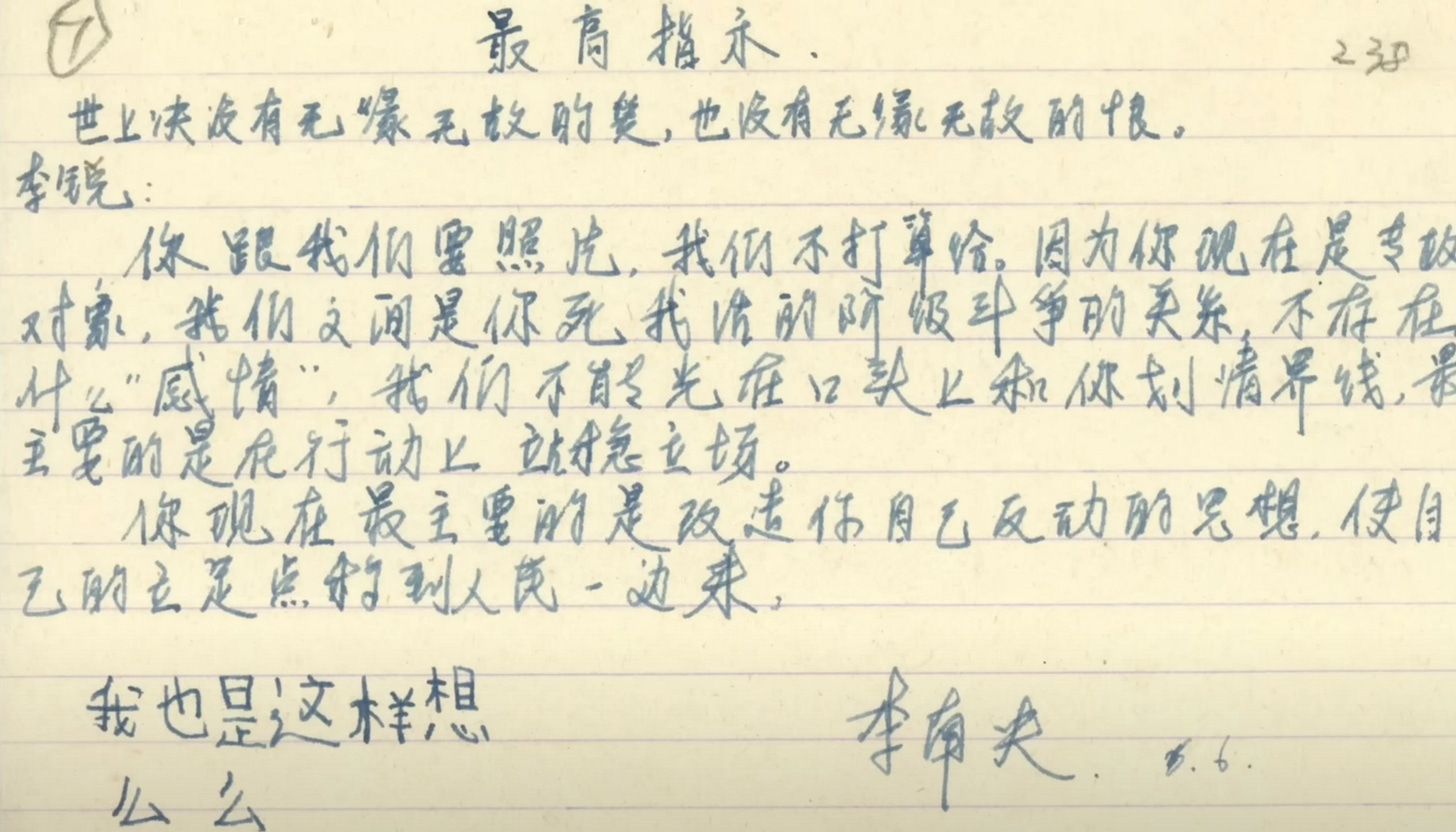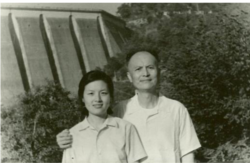Trump, Mao's secretary and his daughter
A post about rationality
The red banners below are known as Duilian (对联), a traditional Chinese New Year decoration that manifests hope and happiness for the year ahead. Here they read —
Vote Left Nothing Left
Trump is Right
Turn Right Everything Right
Next to the Duilian, dressed in red, is our protagonist. Her name is Nanyang Li and she holds many identities — a U.S. citizen, a magnet engineer, a Hoover scholar, a mother, a wife, an individual of her own will, and as you can see, a firm believer in President Trump — but perhaps her most well-known identity is as the daughter of Mao’s secretary.
Both Li and her father are outspoken critics of CCP, especially on its idolization of powerful figures like Mao. Therefore, I was very surprised to see her unwavering support for Trump, yet another powerful figure. I was intrigued by the juxtaposition and wanted to understand how she thinks.
This post is not about politics, ethics or even truth.
It is about rationality, the rationality of who I consider a critical thinker. In order to first understand how Li’s views were shaped, we must start from the beginning, in her most formative years.
The life of Nanyang Li
Nanyang Li was born in 1950, a time of both upheaval and hope. The Chinese Civil War had just ended, giving birth to the People’s Republic of China. Both of Li’s parents were active CCP members at the time, and they had been a part of the revolution since their teenage years.
At the time of her birth, Li’s father was only 33 years old but had already become the Minister of the Publicity Department in the Hunan Province. His political ascent scaled rapidly, soon he would become the Minister of Water Resources in 1952.
In 1958, Li’s father was hand-picked by Mao to be his personal secretary. At just eight years old, Li couldn’t have imagined how quickly her life would be turned upside down. Just one year later, after speaking out against Mao’s disastrous Great Leap Forward — a policy that led to the death of more than 10 million people — Li’s father would spend the next two decades in exile between solitary confinement and labor camp.
Li’s mother, on the other hand, was devout to CCP and worshipped Mao —so much so that she turned in her brother and her husband, in order to demonstrate her unequivocal allegiance to the Party. Even after divorcing Li’s father, when his name was cleared and returned to power in 1984, Li’s mother still wrote to the Party and forced him into retirement. Li’s mother hated her husband for bringing shame into her family. In a letter she wrote in 1976, she summarized their 20-year marriage with a single phrase:
It was a class struggle.
While Li’s father was in exile, Li’s mother was consumed by anger and routinely took it out on Li. During the Cultural Revolution, Li was bullied in school due to her father’s “crime.” When Li’s mother found out, she sneered and said
“You getting bullied has nothing to do with me, you must have your own issues. Don’t ever talk to me about this again…when I was bullied at work because of your dad, who do I cry to?”
Looking back, Li said it felt like sinking into a vast ice crevice. From that point on, her heart closed itself off to her mother, forever. Throughout her childhood, love was conditional. Affection? As foreign as freedom.
Growing up in this kind of family, the sentence Li feared the most was when people said “you’re starting to look more and more like your father.” Li knew how much her mother despised the comparison. For Li’s mother, what had started as enthusiasm to serve the revolution had escalated into fervent loyalty to Mao. Over the years, it had putrefied into bitterness, then hatred, a hatred so large that it overflowed onto her children. In order to shield herself from her mother’s resentment, Li eventually wrote a letter to formally denounce her father in 1967. It read
Between us, there’s only the deadly class struggle. No feeling.
A turning point for Li was the 1976 Tiananmen Incident. Appalled by the violent measures taken against civilians, Li’s belief system was shaken. For someone raised in a household of unwavering loyalty to the Party, the incident cracked the foundation of everything she had been taught to believe.
She then spent two years searching for her father, and she finally learnt the true story about him in 1978. Through his firsthand accounts, Li came to understand the depth of betrayal he had endured, and she also learned things about Mao that the newspapers had never dared to print. Over the next decade, she watched her country continue to wrestle with its own identity — hope and fear, reform and regression. Eventually, Li would leave China for the U.S. in 1990 after witnessing events that further disillusioned her.
Li & Trump
Decades after Li first set foot on the U.S. soil, it is now 2016 and the presidential election was captivating everyone’s attention. When Trump first came onto the political scene, Li was suspicious of Trump’s qualification because he was more of a businessman or a media personality than a politician. However, Li was gradually won over by Trump, and she was not shy about showing her firm support on Twitter, posting things like
Given that Li had experienced systematic indoctrination before finally realizing the harm of worshipping powerful figures, her passionate support for Trump must have been a deeply thoughtful decision.
After going through her online footprint, one plausible theory presents itself
Li believes that Democrats is becoming more and more like the CCP that she so vehemently despises, and Trump is the only antidote.
On 10/21/2023, she posted
The Democrat has become the CCP, and the GOP is as muddy as Kuomintang. Only Trump and MAGA grass root haven’t given up.
Li drives even more parallels between the CCP history and America’s current political climate. For instance, she commented that
The BLM movement is the same as Mao’s strategy to divide and control, turning people against each other in order to solidify control over the masses.
The Green New Deal is the same as planned economy because the government is in charge of it.
Obama’s concern for a divided media makes him the same as the CCP. In an article, Li said that “Obama wishes he would be respected as Mao Zedong whom he is so fond of. He hopes the Democrat holds the power as the CCP does perpetually.”
The treatment towards Trump and his supporters is deeply unjust. For instance, She was sympathetic to the Jan 6th rioters, believing that these rioters were suffering the same injustice that her father went through for acting out against the state. She elaborates on her points in the following video.
These claims are clearly a far stretch at best. For instance, as a quick rebuttal on her comment about the Green New Deal — if any government-led program were to be construed as planned economy, then effectively every country in the world would be on the brink of communism.
One cannot blame Li for her biases. After all, after decades of trauma she went through, even the faintest echo of communism can ring deafeningly loud.
After Trump’s first term, Li was even more fond of Trump. She mentioned that she was impressed by how Trump delivered on 80% of his promise, and she believed that the remaining 20% was botched due to bureaucracy and political infighting. Despite multiple sources (BBC, Poytner Institute) that disputed the validity of those stats, Li still says that she “agrees with every single one of his (Trump) policies.” This includes U.S. foreign policies as well — on the subject of Ukraine War, Li was moved by Trump’s humanitarian effort in terminating the war in order to prevent further casualty. But by that logic — if human life were to trump everything, should China have surrendered to Japan during the invasion?
Many have criticized that Li’s loyalty to Trump is not so different from the blind idolization of Mao. Still, despite repeatedly likening Democrats to the CCP, Li refused to compare Trump with Mao:“it is not fair to compare Trump, a democratically elected leader, with Mao. This analogy is logically incoherent and lacks common sense.”
At this point, it is clear that what’s “logically incoherent and lacks common sense” is Li’s own set of views. However, her firm belief has rendered her oblivious to her own fallacy, and this led to me digging deeper, in search of other rationale.
In a recent interview, I believe I found the answer. When the host asked Li why she supports Trump, she cited anecdotes that assured her of Trump’s upstanding character.
In 1986, a farmer committed suicide so his family could benefit from his life insurance. However, the insurance company discovered this fraud and refused payout. Trump found out about the story and paid off the family’s debt.
In the winter of 1995, Trump’s limo had a flat tire. After a stranger helped out, Trump asked what that person wanted. The stranger said “just some flowers for my wife.” A few days later, a big flower basket arrived on the man’s doorstep, with a card from Trump saying “We paid off your home mortgage, Marla and Donald.”
Whether these stories are true or not is beside the point. What matters is how they became the anchor of Li’s belief. Li went on saying that she was impressed by how Trump is able to keep all his children close under a big family, despite having gone through three different marriages.
“He must be a great father,” Li said, “My family has such little love, the humanity that Trump showed really moved me.”
Outro
Here we examined a mind — a mind that has been poisoned then detoxified, a mind that is strong and fragile, a mind that knows some truths but blind to others — a mind not so different from ours.
The traumas caused by the CCP and her parents are the two cornerstones of Li’s mind. It doesn’t matter whether Trump was the right choice or not, it doesn’t matter if there are opposing opinions, it doesn’t matter if there’s contradicting evidence, it only matters because it feels right to her.
To Li, Trump is everything that she longer for: a disruptor of a society she believes is slipping into communism, and a loving father that she never had. It is both ironic and saddening to witness her intellectual relapse, but as Maya Angelous wonderfully put
I've learned that people will forget what you said, people will forget what you did, but people will never forget how you made them feel.




